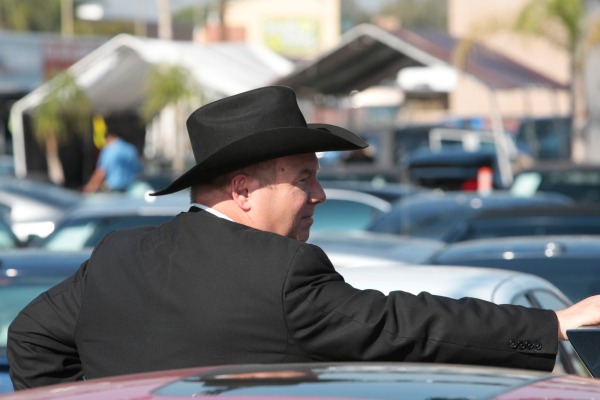
There are two things that car shoppers really hate, says Tom Stuker, the main character of a reality TV show called Car Lot Rescue.
Anyone who has every shopped for a car will agree with Stuker's No. 1 peeve: As soon as the customer steps onto the lot there are three salesmen waiting to pounce.
"That's a big turn-off," says Stuker.
While the second car-buying gripe isn't as dramatic, it is potentially more damaging: The salesman isn't listening to the customer so he doesn't hear her needs.
These two mistakes are often on the laundry list of troubles Stuker finds at the dealerships he advises on Car Lot Rescue, which ran on Spike TV in 2013. Just as celebrity chef Gordon Ramsay transforms troubled restaurants with truth and tough love, Stuker aims to turn around failing car dealerships in the reality series.
Stuker says there are as many insights for shoppers as for salespeople in the eight Car Lot Rescue episodes, which were taped at dealerships across the country. In the first episode, Stuker attempts to rescue a Long Beach, California car dealership run by salesmen "who are more interested in brawling with each other than with making a profit," as the press release puts it.
Long before the world of reality TV called, Stuker was busy flying around the world training car salesmen and helping dealers. Despite claims to the contrary from automakers that say they pour money into dealership sales training, Stuker says the coaching is badly needed, particularly at smaller, independent car lots.
"McDonalds spends more training an 18-year-old kid with zits to sell a hamburger than we do to sell the second-largest purchase" of most customers' lives, he says.
Stuker, a former car salesman from Rockford, Illinois, is quick to add that poor car-selling skills aren't really the fault of salespeople. The hiring process in dealerships is usually poor and the training is almost non-existent, he says.
"By the end of my week at the dealership, I hope the salespeople are more professional, the managers are more effective and the dealership is a much more attractive place to buy an automobile," he says.
Stuker began training younger salesmen informally and was then asked to do it by the general manager of his dealership. His role as a sales teacher continued to grow until he began to travel and train salespeople across the country.
Stuker tells salespeople that instead of using pressure and manipulation, they must understand what the customers need and then assist them in finding the right vehicles.
"I tell salespeople, 'Your job isn't to sell cars because people don't want to be sold cars,'" Stuker says. "A salesperson's true job is to help customers make informed decisions."
Once the car sale is complete, he tells salespeople to maintain a relationship with the customer with periodic phone calls, perhaps reminding them of service appointments or offering to answer questions about the car. Then that person will become a customer for life, and recommend friends and family members. Studies have shown that people who buy from a recommended salesperson will pay more to have a better experience, Stuker says.
Stuker's advice apparently works. Sales trainer, author and TV host Grant Cardone was once Stuker's student.
"He was a salesperson making $3,000 a month when I met him," Stuker says of Cardone. "In the first six months he made $90,000 selling cars. He went from a dozen sales a month to about 30 cars a month." Several other Stuker trainees went from being car salesmen to managers to owners of dealerships.
Not surprisingly, Stuker is sometimes critical of car-shoppers' tactics. He says many car shoppers lie to salespeople, feeling that it is justified as a way to level the playing field. It's not uncommon for a customer to say he has a doctor's appointment as a way to escape a tenacious salesman. Others even invent fictitious price quotes from unnamed dealerships to drive the price down. Despite the bad reputation car salesmen have, Stuker says customers need to treat them as innocent until proven guilty.
Instead of shoppers approaching the salesperson with a chip on their shoulders, Stuker says, "The best thing customers can do is literally articulate their needs very thoroughly: Be open and honest about what you want and what your expectations are."
When friends ask Stuker how to navigate the dealership experience, he steers them to the dealership's Internet department. The prices are good even without negotiating, he says. So, after getting price quotes from several dealerships, choose one based on proximity, he says. But before closing the deal, make sure there are no hidden fees. Another tip Stuker offers is simply to call a dealership's sales manager and ask for the name of the best salesperson.
While Stuker advocates using the Internet, he thinks it's close to "a fulfillment process rather than a sales process."
That's not necessarily a good thing for car shoppers, he says. "There are no test-drives over the Internet," Stuker says. And he believes that advice from a good car salesman will always be something the Internet can't completely replicate.